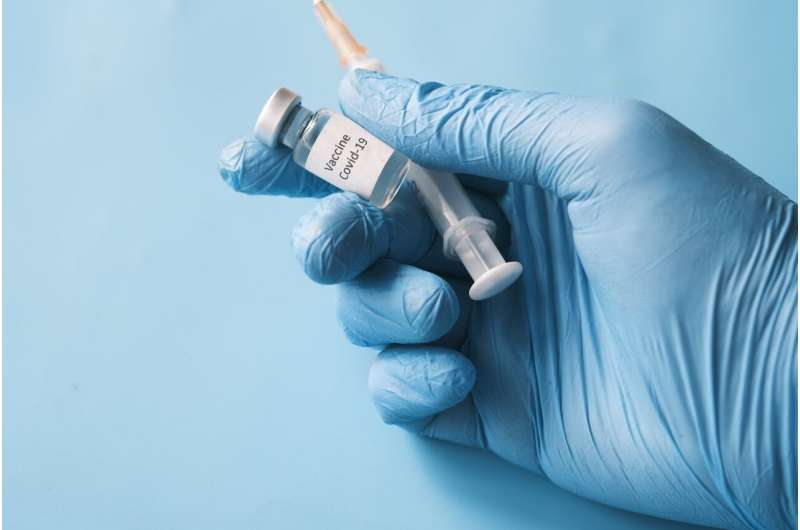
Credit: Towfiqu barbhuiya from Pexels
New research published in The Lancet Regional Health America from the University of Alabama at Birmingham School of Education and Human Sciences, College of Arts and Sciences, and Heersink School of Medicine found that the rollout of the COVID-19 vaccine in the United States was associated with a decrease in anxiety and depression rates among adults.
However, some groups, including Black Americans, non-Hispanic people of color, and lower-income adults, experienced worsened mental health after certain phases of the vaccination rollout.
Lead author of the paper, “Impact of phased COVID-19 vaccine rollout on anxiety and depression among US adult population, January 2019–February 2023: a population-based interrupted time series analysis,” and director of the UAB Community Counseling Clinic Yusen Zhai, Ph.D., says existing evidence already points to increased mental health problems among the US population following the COVID-19 outbreak.
However, he says there is a notable lack of empirical evidence to assess the potential impact of different phases of the COVID-19 vaccine rollout on mental health, particularly at the population level.
“The empirical evidence from this study suggests that the phased vaccine rollout has had disparate effects on mental health across the US population, underscoring the need for careful planning in future phased disease prevention and intervention strategies,” Zhai said.
Zhai and his team conducted a US population-based multi-intervention interrupted time series analysis using both deep learning and statistical approaches. They analyzed four waves of data from the CDC’s Behavioral Risk Factor Surveillance System (January 2019–February 2023) to assess changes in the weekly prevalence of anxiety and depression following all major phases of the COVID-19 vaccine rollout from 2020 to early 2023, accounting for events related to the pandemic.
The study produced robust findings that identified both positive and negative mental health outcomes associated with this gradual, phased COVID-19 vaccine distribution. Different COVID-19 vaccine rollout phases helped alleviate the mental health burden in the United States. Among the general US adult population, anxiety and depression rates decreased during specific phases of the rollout.
For example, prioritizing vaccinations for education and childcare workers led to a significant decrease in anxiety and depression, benefiting not only childcare workers but also caregivers and families.
A significant reduction in anxiety and depression also occurred after the booster shots for all adults, providing broader protection and easing anxiety associated with the variants. In addition, authorizing vaccines for young children eased the mental health burden among caregivers worried about their children’s vulnerability and limited treatment options.
Notably, this study found that more Black/African Americans, non-Hispanic people of color, and lower-income adults experienced worsened mental health following the initial vaccination rollout (i.e., Phase 1). Zhai says the rise in anxiety and depression among these groups can be attributed to a combination of historical mistrust, persistent discrimination, and the added pressure of economic hardship during the pandemic.
“Concerns about the safety and effectiveness of the vaccine were more pronounced in these communities, partly due to previous experiences of mistreatment or deception by health care providers and authorities,” Zhai said. “This skepticism was exacerbated by the rapid development and distribution of the vaccine, making it more difficult for people to feel confident about getting vaccinated.”
The study also found that certain subgroups experienced significant reductions in anxiety and depression during specific phases of the COVID-19 vaccine rollout.
- Women: Women reported lower levels of anxiety and depression during different phases of the vaccination rollout, including when vaccines became available to education/childcare workers, adolescents, and young children.
- Parents/Caregivers: People raising children saw improvements in their mental health when vaccinations were offered to educators/childcare workers and young children.
- People with poor physical health: People with poor physical health benefited from the introduction of booster shots.
Zhai says these findings serve as a reminder that public health officials need to consider mental health alongside physical health during disease prevention efforts. That includes providing mental health resources, ensuring access to vaccines, providing clear communication about prevention measures and strategies, and planning for shortages.
More information:
Yusen Zhai et al, Impact of Phased COVID-19 Vaccine Rollout on Anxiety and Depression Among the US Adult Population, January 2019–February 2023: A Population-Based Interrupted Time Series Analysis, The Lancet Regional Health – Americas (2024). DOI: 10.1016/j.lana.2024.100852
Quote: Using deep learning, new research suggests phased COVID-19 vaccine rollout had mixed results for mental health (2024, August 12) Retrieved August 12, 2024 from https://medicalxpress.com/news/2024-08-harnessing-deep-phased-covid-vaccine.html
This document is subject to copyright. Except for fair dealing for private study or research, no part may be reproduced without written permission. The contents are supplied for information purposes only.
 Healthy Famz Healthy Family News essential tips for a healthy family. Explore practical advice to keep your family happy and healthy.
Healthy Famz Healthy Family News essential tips for a healthy family. Explore practical advice to keep your family happy and healthy.


